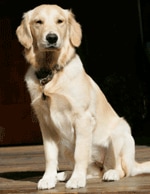Source: Medscape Today
By: Zosia Chustecka
The latest study demonstrating that dogs can sniff out cancer has confirmed the notion that a specific cancer smell does exist, and has added fuel to the idea of developing a test based on odor.
Previous studies have reported on dogs that can detect lung and breast cancer from breath samples, and there has been anecdotal evidence suggesting that dogs can detect melanoma, bladder, and ovarian cancers.
In this latest study, published online January 31 in Gut, a Labrador retriever was trained over several months to sniff out colorectal cancer in breath and watery stool samples.
Hideto Sonoda, MD, and colleagues from Kyushu University in Fukuoka, Japan, report that this dog was then tested with samples obtained from colorectal cancer patients and from volunteers, some of whom had gastrointestinal problems such as ulcers and inflammatory bowel disease.
The dog correctly identified cancer in 33 of 36 breath tests and in 37 of 38 stool tests. This equates to 95% accuracy overall for the breath test and 98% accuracy overall for the stool test, the researchers report.
The highest detection rates were among samples taken from patients with early-stage cancer, they add. Samples taken from smokers and from people with other gastrointestinal diseases, which might be expected to mask or interfere with cancer odors, did not appear to confuse the dog.
“This study shows that a specific cancer scent does indeed exist,” the researchers conclude.
 |
They are not suggesting using dogs in clinical practice, however. They point out that training the dog was expensive and time-consuming, and that ability and concentration vary between individual dogs and even the same dog on different days. OCF The dog’s concentration tends to decrease during the hot summer season; hence, they conducted their test between November and early June.
What they do propose is that this research could be used to develop cancer detection tests based on “odor materials.”
This would involve identifying the cancer-specific volatile organic compounds (VOC) that are being detected by dogs using chemical analysis, and then developing an early cancer detection sensor that would substitute for the dog, they explain.
There has already been some work conducted on VOC in exhaled breath (using gas chromatography and mass spectroscopy) for the early detection of breast and lung cancer, they note, although they add that this work is still preliminary.
“We hope that the results of the present study will provide encouragement for the development of cancer detection and solving the biological character of cancer using odor material,” Dr. Sonoda and colleagues conclude.

Leave A Comment
You must be logged in to post a comment.